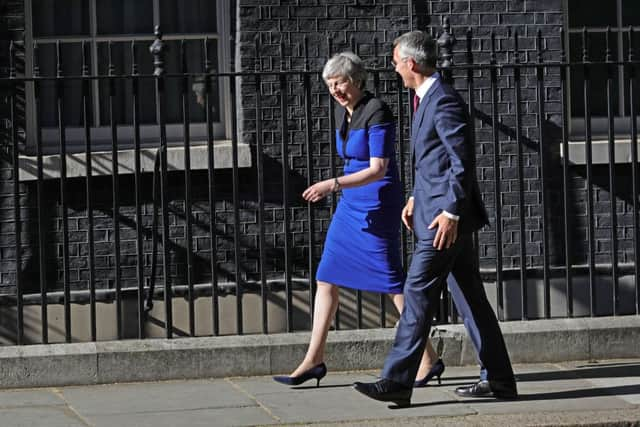May makes a final Brexit offer as Tories warn her not to compromise
The Withdrawal Agreement Bill will be introduced in parliament in the week beginning 3 June - the same week as Donald Trump’s state visit and a crucial by-election in Peterborough - leaving just three weeks to find a Commons majority on Brexit.
Last night the Prime Minister made a final offer to Jeremy Corbyn in an attempt to break the deadlock before voters punish the government in next week’s European elections.


Advertisement
Hide AdAdvertisement
Hide AdThe Prime Minister is understood to have requested the meeting, and also dispatched her chief Brexit negotiator Olly Robbins to Brussels for two days of talks about the possibility of making changes to the Political Declaration to strengthen protections for workers rights and request a say in future EU trade deals for the UK.
But she set out terms for a deal that offers only a temporary customs arrangement with the EU, and no confirmatory referendum as demanded by Labour MPs.
There remains little hope of a deal, with senior Labour figures saying the party will not sign an agreement that the next Conservative leader could tear up.
And as Tory MPs warned the Prime Minister against an agreement that could split their party, Number 10 sources insisted the government would not sign up to the “permanent” customs union at the heart of Labour’s Brexit policy.
A Downing Street spokesman said last night’s talks between Mrs May and Mr Corbyn were “both useful and constructive” and senior figures from both parties would meet again today.
“This evening the Prime Minister met the Leader of the Opposition in the House of Commons to make clear our determination to bring the talks to a conclusion and deliver on the referendum result to leave the EU,” the spokesman said. “We will therefore be bringing forward the Withdrawal Agreement Bill in the week beginning the 3rd June.
“It is imperative we do so then if the UK is to leave the EU before the summer Parliamentary recess.”
At a marathon Cabinet meeting ministers agreed to continue the cross-party efforts despite Tory opposition, but stressed it was “imperative” for a Brexit deal to get through parliament by the summer.
Advertisement
Hide AdAdvertisement
Hide AdWith Theresa May’s future linked to the passage of a Brexit deal, getting legislation through the Commons and Lords by the summer break could also pave the way for her departure from Number 10.
Some 13 former ministers, together with the chairman of the backbench 1922 Committee, Sir Graham Brady, wrote to Mrs May urging her not to risk splitting the party by conceding to Labour’s key demand.
Signatories include potential leadership contenders Boris Johnson and Dominic Raab. The letter said the Prime Minister cannot bind her successor, so any agreement with Labour would be “at best temporary, at worst illusory”.
“We believe that a customs union-based deal with Labour will very likely lose the support of Conservative MPs,” the letter said.
In Brussels, officials said there were no negotiations under way and the EU was still on a “Brexit break”.
“We will come out of the Brexit break if there is something happening in London,” European Commission spokesman Margaritis Schinas said.